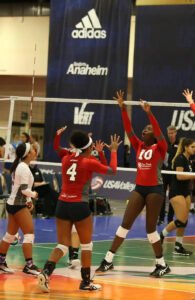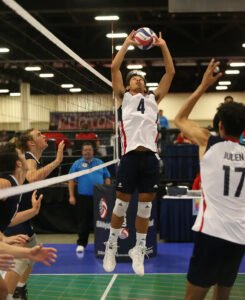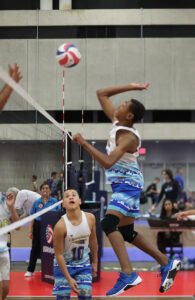Mission Statement

USA Volleyball is committed to being a leader within the volleyball world and beyond by increasing and celebrating diversity, actively addressing any inequities within the organization and the sport, and creating an environment of inclusion in which all people feel safe, respected and valued. USA Volleyball is devoted to:
Prioritizing diversity by understanding USA Volleyball’s current demographics, setting target goals in key areas, and establishing a plan to increase representation and voice of underrepresented groups at all levels of play and leadership.
Increasing equity by finding new strategies around lowering the barriers to entry, offering resources and creating opportunities for members of historically marginalized communities to get involved in and/or advance in the sport.
Creating a culture of inclusion by establishing culturally competent training and educational resources across the organization and membership, as well as implementing proactive policies and operations within USA Volleyball and its regions.
Committees

In order to reach our DEI goals, USA Volleyball has established three committees.
USA Volleyball Diversity, Equity and Inclusion Task Force: A board-level committee focusing on DEI issues across the sport in the United States
USA Volleyball Staff DEI Team: Comprised of USAV staff and an athlete representative, this team is committed to individual and organizational staff efforts to build respect, fairness, dignity and equality by creating awareness and challenging beliefs through education and training.
USA Volleyball RVAA Diversity and Inclusion Task Force: This task force consists of region commissioners, minority club directors from boys and girls clubs, minority Olympic athletes, and a member of the USAV Diversity, Equity and Inclusion Task Force. The task force was formed to research and offer information, resources and recommendations on ways to bring awareness to discrimination and increase playing, coaching and leadership opportunities for minority and underserved populations. More information can be found on the RVAA website.
Programs and Initiatives
Awards & Grants

The USOPC Award and Southern Intercollegiate Athletic Association (SIAC) Grant
The USOPC awarded USA Volleyball with the 2020 DEI Choice Award. The award recognizes a National Governing Body (NGB) or high performance management organization (HPMO) for best practices in advancing diversity, equity and inclusion, as determined by a vote of NGB and HPMO peers. USAV won the award based on its 2019 grant of $400,000 to Historically Black Colleges and Universities to help launch Division I and II men’s volleyball programs. Read more about the award.
In September 2019, the Southern Intercollegiate Athletic Association (SIAC) announced the addition of men’s volleyball as the league’s 14th-sponsored sport. The addition was possible because of a $1 million grant from First Point Volleyball Foundation and USA Volleyball. The league is scheduled to begin in the 2020-21 season. Read more about the grant.
Partnerships and Collaborations
Starlings, Inc.
The mission of Starlings Volleyball, USA is to positively impact the lives of at-risk girls through the sport of volleyball.
- Starlings, Inc.
- A Starlings Heart (7/29/20)
- How Michigan Elite Became a Starlings Sister Club (8/31/2020)
- Club Cactus Juniors: Helping More Kids Play Volleyball (9/29/20)
General External Resources
Terminology
Need to brush up on your terminology? Read James E. Wright’s The Language of Inclusion (PDF)
Organizations Specializing in DEI and Sport
- RISE
- Take note of RISE’s digital learning series, which covers bias, equality vs. equity, empathy, identity, leadership, privilege, racism, sports as a vehicle for change. Topics are covered via readings, video and interactive activities.
- Inclusion Playbook
- Watch for upcoming webinars.
Professional Training Organizations
- Traliant
- Short vignettes from BlindSpots on YouTube
- Full Training Suite that includes some free training offerings
Diversity, Equity and Inclusion
Top TED Talks
- How to Get Serious About Diversity and Inclusion in the Workplace – Janet Stovall
- Colour Blind or Colour Brave? – Mellody Hobson
- How to Outsmart Your Own Unconscious Bias – Valarie Alexander
- How to Overcome Our Biases? Walk Boldly Toward Them – Verna Myers
- Three Ways to be a Better Ally in the Workplace – Melinda Epler
YouTube: Inclusion Starts with “I”
Mental Health
988 (Suicide and Crisis Hotline)
Need support now? If you or someone you know is struggling or in crisis, help is available. Call or text 988 or chat 988lifeline.org.
Implicit Bias
Microaggressions
Intersex Awareness
-
-
- Five Myths We Need to Shatter – Amnesty International
-
LGBTQ Resources
-
-
- Supporting LGBT Youth – National Education Association
- Gender Spectrum
- The Trevor Project
- Sports Equality Foundation
- Headstrong Mindset
- Vollequality
-
Disability
Black History Month
Learn more at blackhistorymonth.gov.
Learn about the origins of Black History Month on the Association for the Study of African American Life and History website.
Martin Luther King Jr. Day
Martin Luther King Jr. Day of Service (MLK Day) is the only federal holiday that is also designated by Congress as a national day of service.
No matter the choice, service empowers individuals, strengthens communities, bridges barriers, creates solutions and moves us closer to Dr. King’s vision of a beloved community. It breaks down barriers by bringing people from different backgrounds together and it benefits those who choose to serve. Coretta Scott King said, “The greatest birthday gift my husband could receive is if people of all racial and ethnic backgrounds celebrated the holiday by performing individual acts of kindness through service to others.”
We encourage you to get involved and actively serve your community. Ideas for service can be found at https://engage.pointsoflight.org/ or https://www.americorps.gov/.
Transgender Awareness and Transgender Remembrance Day
-
- GLAAD Transgender Resources
- Transgender Day of Remembrance 2020 Statistics – Forbes
- Transhood – HBO documentary (trailer)
- Disclosure – Netflix documentary (trailer)
Native American Heritage Month
November is Native American Heritage Month, with the Friday after Thanksgiving recognized as Native American Heritage Day. According to the Native Hope website, the month was established to honor and recognize Native Americans as the first people of this nation and to celebrate both their cultural heritage and integral importance to our past, our present, and our future.
President Obama signed “The Native American Heritage Day Resolution” in 2009, although many federally recognized tribes did not support the day due to its placement on Black Friday.
A way to honor Native Americans on this day is to learn about and acknowledge the Native Americans land on which you live. Download the Native Land app on you iPhone or Android and type in your address to learn more about the tribes and history in your area.
More Resources
Watch Native American stories on PBS
Native American Heritage Month audio and video files, exhibits and learning materials
National Congress of American Indians
Teen Vogue: How to Celebrate Native American Heritage Month
NPR: Podcast links and other materials
Anti-Asian Violence
Resource Websites
Statistics, Updates, Education and Allyship
Articles
Anti-Asian Attacks Rise During Pandemic (NPR)
Asian-Americans Are Being Attacked. Why Are Hate Crime Charges So Rare (NYT)
Asian-Americans Reported 3,800 Hate-Related Incidents During Pandemic (Guardian)
America’s Long History of Scapegoating Its Asian Citizens (National Geographic)
How to be an Ally (USA Today)
Report
USA Volleyball condemns and will not tolerate discrimination or racism within our family. We urge our members to report any race-based assaults, verbal or physical, at our member clubs or sanctioned events so we can take appropriate action. Report through SafeSport.
National Coming Out Day
According to the Human Rights Campaign, National Coming Out Day was first observed 32 years ago on the anniversary of the National March on Washington for Lesbian and Gay Rights. The day served as a reminder that one of the LGBTQ+ community’s most basic tools is the power of coming out.
Nonprofit Athlete Ally shared these sobering statistics. Statistic source: Johnson, A., Miranda, L., Lee, M. (2018, June). Play to Win: Improving the Lives of LGBTQ Youth through Sport. Human Rights Campaign; Douall, Watson, Smith, Homma & Saewyc, Are we leveling the playing field? Trends and disparities in sports participation among sexual minority youth in Canada (2018).
- More than 80% of people have witnessed or experienced homophobia in sports (Athlete Ally)
- LGBTQ+ youth are twice as likely to drop out of sports compared to their heterosexual peers (Athlete Ally)
- About 28% of LGBTQ+ student-athletes report having been harassed or assaulted while playing on a school sports team because of their sexual orientation or gender expression (Athlete Ally)
- Lesbian, gay, bisexual, and transgender youth are more than 4x more likely to attempt suicide than their peers (Trevor Project)
- Accepting adults decrease the risk of LGBTQ+ youth attempting suicide by 40% (Trevor Project)
Learn more with these resources:
- Dozens of Coming Out Stories from LGBTQ+ people in sports at Out Sports
- A free Online Course for Coaches and Athletic Leaders on LGBTQ+ Inclusion in Athletics provided by Athlete Ally
- A free Coming Out Handbook for LGBTQ+ Young People provided by the Trevor Project
- A personal coming out story from Athlete Ally’s first pro volleyball ambassador.
